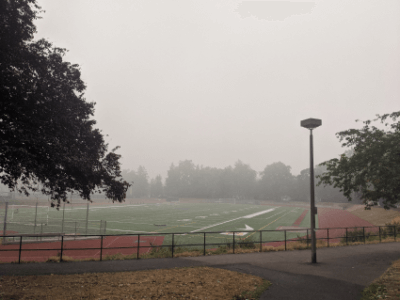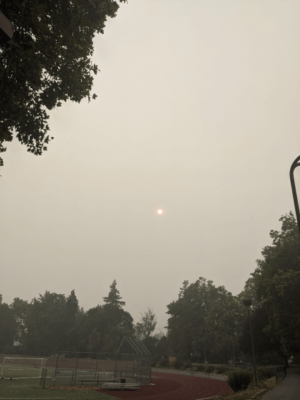.
.

In a photo that does little justice to the actual impact on the community, choking smoke can be seen in Portland’s Grant Park on Saturday, September 12. The trees in the distance are on the other side of the 100 yard football field.
.
.

On September 16, the sun almost emerged.
.
___
.
…..I have to admit, Portland has kicked my ass this summer.
…..Two fires continue to rage here. I’m sure you’ve heard about this city’s Black Lives Matter demonstrations that have also sparked pesky vandalism by dozens of mostly White activists. While their activities seem banal enough – a dumpster fire here, a picnic table on fire there – this behavior shamefully threatens to commandeer BLM’s objectives and gives life to a cynical and evergreen pre-election message stoking White suburban fear. The vandalism tests the patience of even the most tolerant and hopeful of local citizens.
…..Now mix in the fires of climate change – hot, powerful winds fanning flames on a drought-laden state – and the result is living in, for now, the epicenter of the world’s worst air quality. Those who dare step outside do so with the knowledge that the oxygen taken into our lungs is laced with microscopic particles from everything these fires destroy – forests, sure, but also household plastics and chemicals. So now, in addition to witnessing the ongoing heartbreak of entire communities who have lost everything, we have a new and unsettling respiratory challenge to cope with.
…..From these challenges come the stories of neighbors helping neighbors and the heroism of firefighters that brighten the spirit, but what Oregon needs most is some of that precious rain it is famous for, and a long range plan to combat the effects of climate change. Having someone in the White House who can simply acknowledge the existence of climate change – and systemic racism – would be, well, a breath of fresh air.
.
___
.
…..I am saddened by the September 16th passing of the essayist, newspaper columnist and MacArthur Foundation “genius” Stanley Crouch, whose voice was vitally important to jazz, once describing it as “the highest American musical form because it is the most comprehensive, possessing an epic frame of emotional and intellectual reference, sensual clarity and spiritual radiance.”…..
…..Often controversial and always passionate, his views on jazz, politics, and race frequently sparked outrage or applause, and were almost certain to provoke debate. He was an early advocate for and artistic consultant of Wynton Marsalis, and along with Marsalis and the writer (and Crouch mentor) Albert Murray helped establish New York’s Jazz at Lincoln Center. These relationships and his efforts will have an impact on jazz for generations.
…..On a personal level I am indebted to Stanley for his early support of my work. Shortly after I began Jerry Jazz Musician over twenty years ago, he reached out with meaningful encouragement, and I would occasionally receive unsolicited emails from him after he read something he enjoyed on the site, telling me to “keep goin’!” and concluding each correspondence with his signature message “V.I.A.” (Victory is Assured). Stanley even talked up this website on national television one evening, and subsequently wrote that Jerry Jazz Musician is “the most ambitious and remarkable jazz magazine I have ever seen.” (Yes, my head swelled).
…..I interviewed Stanley several times, once immediately following his controversial firing by Jazz Times for his April, 2003 essay “Putting the White Man in Charge,” which was an aggressive defense of the jazz idiom and its Black heritage. I also interviewed him about his collections of essays, his novel Don’t the Moon Look Lonesome, his appreciation for Ralph Ellison, and finally, in 2014, his biography of Charlie Parker, Kansas City Lightning. You can find a list of these interviews by clicking here.
…..So, along with his fellow writers Nat Hentoff and Gary Giddins and the photographer Lee Tanner, Stanley’s early support of my creative endeavors provided me with the critical inspiration I needed to press on.
…..My son knew about how much Stanley meant to me, and wrote me a text this morning expressing sadness about his passing. My response to him: “You just never know who will come along and have an impact on your life.”
…..There are many obituaries devoted to Stanley today, notably in the New York Times, and on NPR (written by the jazz pianist Ethan Iverson).
.
___
.
Things to look for in the coming days…
…..The third collection of poetry titled “Poetry reflecting the era of COVID, Black Lives Matter, and a heated political season.” This edition – with an intended publication date sometime during the week of September 21 – will include work from well over 30 poets, and features the art of the realist painter Vakseen…To read the first two editions, click here and here.
…..The historian and most eminent jazz writer of his generation Dan Morgenstern joins pianist Christian Sands – the Creative Ambassador of the Erroll Garner Jazz Project – in a conversation about Garner’s historic legacy….Also…my interview with Will Friedwald, author of Straighten Up and Fly Right: The Life and Music of Nat King Cole, will be published later this month. To read an excerpt from this outstanding book, click here.
…..As for writing opportunities, the deadline for entering a story in the 55th Jerry Jazz Musician Short Fiction Contest is September 30. For contest details, please click here. You can read Nathaniel Whelan’s “A Failed Artist’s Paradise” – the the winning story of the 54th Contest – by clicking here. Short-listed stories from that contest by Jeannie Monroe, Jack Tasker, and Geoff Polk have also been published, with more to come in upcoming weeks.
…..Poets are invited to submit their work for consideration in the autumn collection of jazz poetry, which will be published sometime in November. Please submit your work by October 25. For complete information about publishing terms and conditions, please click here. To read the recently published summer collection, click here.
.
A few bits of news…
…..The Covington, Louisiana poet Diane Dees wrote to inform me that she has just published a chapbook entitled Coronary Truth, which is available from Kelsay Books. You can find information about it by clicking here…Alan Yount recently published a poem titled “The Tragedy of One Man” in the September 2020 issue of Big Scream, the poet David Cope’s journal that has been published for 45 years. That issue also includes a recently discovered poem by Allen Ginsberg, prompting Yount to write that he is “very pleased to be on the same table of contents page with Allen Ginsberg, David Cope, and 28 other poets.”
…..Finally, I received news worth sharing from a media rep for Savage Ticket, described as a “new platform looking to redefine the ways we present, share, and enjoy music,” and who is launching a video contest for musicians and fans to share how they fell in love with jazz. According to Savage Ticket, the jury features legendary jazz musicians and Grammy Award winners such as Al Di Meola, Dorthaan Kirk, and Karrin Allyson, and the grand prize for the winner is $2500. Beyond that 100 participants will be rewarded with $100 for their videos, and Savage Ticket is making a $50,000 donation to The Jazz Foundation of America’s Covid-19 Musicians in order to support artists in need. Seems like a worthy event to share…Click here for more details.
Best to all,
Joe
.
.
.
.
Listen to the 1950 recording of Charlie Parker and Dizzy Gillespie playing “My Melancholy Baby”
.
.
.







































